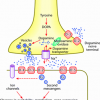Lithium has an anabolic effect on the growth of skeletal muscles. It does this by activating the canonical Wnt/Beta-catenin pathway. Lithium is one of the best known activator of this pathway. Other substances like testosterone and the anabolic steroid Trembolone, also activate this pathway and therefore, promote muscle growth. I've discussed other effects of activating this pathway, such as lung and joint regeneration and someone posted a study about the heart regenerating also.
This one study from 2002, claims that lithium is MORE anabolic than IGF-1.
GSK-3beta negatively regulates skeletal myotube hypertrophy.
Abstract
To determine whether changes in glycogen synthase kinase-3beta (GSK-3beta) phosphorylation contribute to muscle hypertrophy, we delineated the effects of GSK-3beta activity on C(2)C(12) myotube size. We also examined possible insulin-like growth factor I (IGF-I) signaling of NFAT (nuclear factors of activated T cells)-inducible gene activity and possible modulation of NFAT activation by GSK-3beta. Application of IGF-I (250 ng/ml) or LiCl (10 mM) alone (i.e., both inhibit GSK-3beta activity) increased the area of C(2)C(12) myotubes by 80 and 85%, respectively. The application of IGF-I (250 ng/ml) elevated GSK-3beta phosphorylation and reduced GSK-3beta kinase activity by approximately 800% and approximately 25%, respectively. LY-294002 (100 microM) and wortmannin (150 microM), specific inhibitors of phosphatidylinositol 3'-kinase, attenuated IGF-I-induced GSK-3beta phosphorylation by 67 and 92%, respectively. IGF-I suppressed the kinase activity of GSK-3beta. IGF-I (250 ng/ml), but not LiCl (10 mM), induced an increase in NFAT-activated luciferase reporter activity. Cotransfection of a constitutively active GSK-3beta (cGSK-3beta) inhibited the induction by IGF-I of NFAT-inducible reporter activity. LiCl, which inhibits GSK-3beta, removed the block by cGSK-3beta on IGF-I-inducible NFAT-responsive reporter gene activity. These data suggest that the IGF-I-induced increase in skeletal myotube size is signaled, in part, through the inhibition of GSK-3beta.
Expression of beta-catenin is necessary for physiological growth of adult skeletal muscle.
Abstract
Expression of beta-catenin is known to be important for developmental processes such as embryonic pattern formation and determination of cell fate. Inappropriate expression, however, has been linked to pathological states such as cancer. Here we report that expression of beta-catenin is necessary for physiological growth of skeletal muscle in response to mechanical overload. Conditional inactivation of beta-catenin was induced in control and overloaded muscle through intramuscular injection of adenovirus expressing Cre recombinase in beta-catenin floxed mice. Individual muscle fiber analysis was performed to identify positively transfected/inactivated cells and determine fiber cross-sectional area. The results demonstrate that fiber growth is completely inhibited when the beta-catenin expression is lost. This effect was cell autonomous, as fibers that did not exhibit recombination in the floxed mice grew to the same magnitude as infected/noninfected fibers from wild-type mice. These findings suggest that beta-catenin may be a primary molecular site through which multiple signaling pathways converge in regulating physiological growth.
PMID:16436469 Full text Free
The only problem here is that many popular substances (quercetin, resveratrol, curcumin, soy isoflavones) strongly inhibit this pathway. So if you're taking any of these while lifting weight, it might hinder your progress.
Edited by Lufega, 10 September 2011 - 03:03 AM.



















































